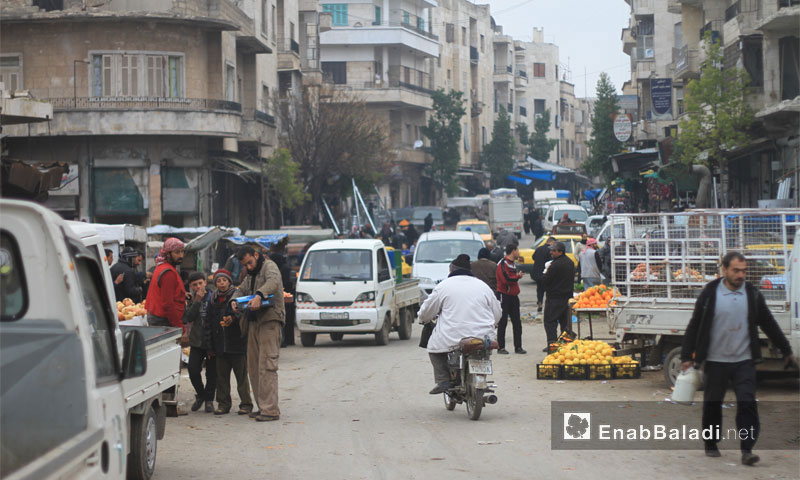



Idlib – Enab Baladi
Majid Jabr, a young man in his thirties, holds a bowl of water in his hand as he splashes water onto the fresh parsley, mint and various vegetables lined up on his cart in the city of Idlib. His actions attract the attention of bystanders and pedestrians as he calls out the prices of vegetables at the top of his voice.
“Let people breathe a little,” Jabr told Enab Baladi, referring to the ceasefire that took effect on Friday 30 December 2016.
That was as much as Jabr was prepared to say before continuing on his way but his brief words showed the reality of life for the people of Idlib . Despite their rejection of the ceasefire since it has already been violated hundreds of times, it is implicitly accepted.
Syrian opposition factions reached agreement on a ceasefire, announced on 29 December 2016 under Russian-Turkish sponsorship.
Idlib city’s markets are witnessing increased movement with the continuation of the truce announced across Syria. While the truce is described as “incomplete”, movement has returned to most of the province, according to the residents Enab Baladi surveyed, including those who visit the market on a daily basis.
Mounir Abid, an architecture graduate living in Idlib city, considered that the truce in its current form “is not the ideal solution for securing normal life, but it is definitely a chance for people to go about their lives with less danger.”
The planes are not absent from the city’s sky but they are “less frequent”, according to Abid who said, “Visiting people, going to the market and going for walks are perhaps appropriate in our current situation. We have been living under war for years and today, the situation is much better in comparison to what was before.”
The architecture graduate spoke without mentioning politics or the agreements, “As most people do not look at things from that perspective. They do not care whether it is a real truce or a break for the pilots, who may return to the skies after a while.” He concluded, “We live in a state of relative truce… Basically, we live each day as it comes and God will relieve us tomorrow.”
Media activist Khalid al-Hamawi, one of those displaced from Hama to Idlib, sees that overall, the increased movement in the province “is normal and does not necessarily mean people accept the so-called truce.” He said, “It is logical for people to move around and go about their business when there is peace due to the truce or for other reasons.”
“Residents will not care if the war returns,” according to al-Hamawi, who predicts the return of the bombing at any time, “It is not the first time that a truce happens.”
The activist wondered, “What truce are we talking about when Wadi Barada is being targeted with (explosive) barrel bombs and attempts to storm it every day, and when warplanes are bombing Jisr al- Shugur and Aleppo’s countryside?” He described the recent days as “a period of rest during which things are rearranged in order to return to killing and destruction. Residents know the hatefulness of the sectarian militias and al-Assad’s shabiha (thugs) very well.”
The al-Assad forces continued their military campaign against Wadi Barada in Damascus’ countryside, using the excuse that there are fighters from the Fateh al-Sham Front in the area, although the agreement signed with the opposition makes no exceptions for any opposition faction or area of Syria.
Mohammed al-Zein, a fuel salesman in the city of Ariha in Idlib’s southern countryside, thinks that a truce will be achieved in Syria sooner or later, “Everyone has taken what they want from us and they no longer need anything. This will ensure that they seek a truce.”
“Nothing else matters, we just need a period of calm and rest,” concluded al-Zein. He added, “We need an entire year at the very least for our wounds to heal but we will continue the revolution because blood is never forgotten. This is not the truce the Syrian people want.”
Major cities in the province have witnessed recurrent demonstrations since the start of the ceasefire demanding the achievement of the revolution’s primary principles of freedom, justice and the toppling of the Syrian regime.
The inhabitants of Idlib province are unified in their attempt to steal a few quiet days until the entire picture becomes clearer and they can see what the truce will lead to. They insist that, “No one here will give up the fundamental demands of Syrians and the principles of the revolution.”
if you think the article contain wrong information or you have additional details Send Correction